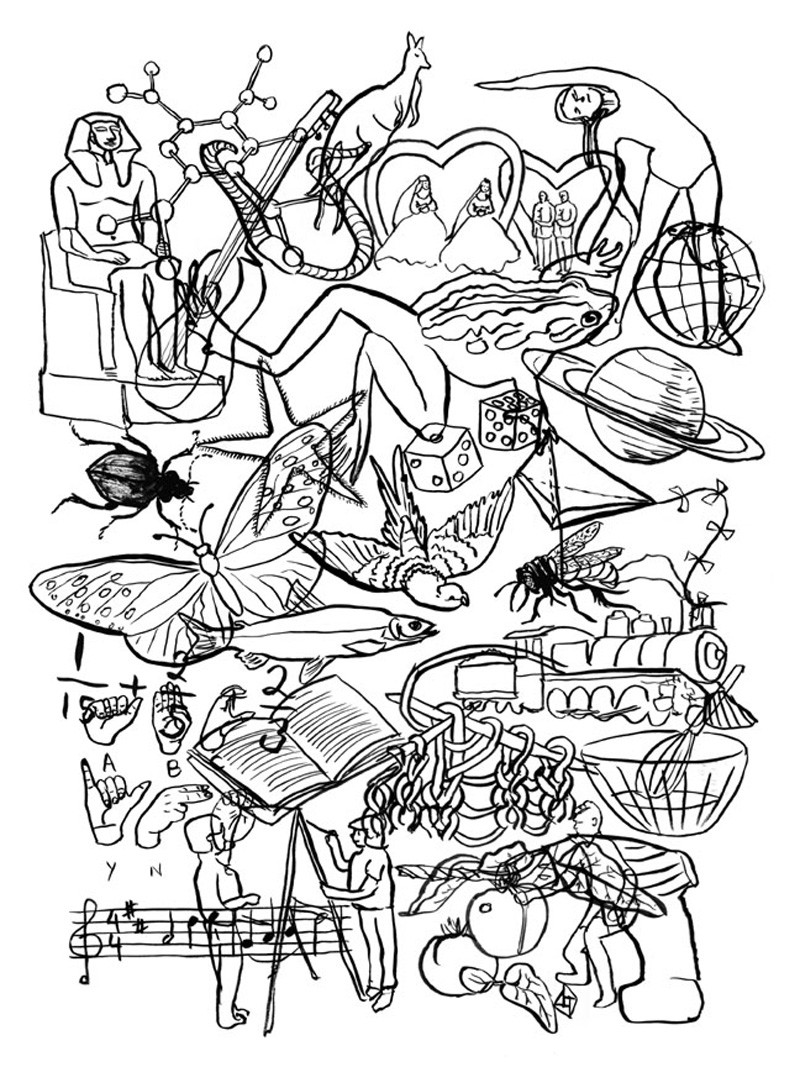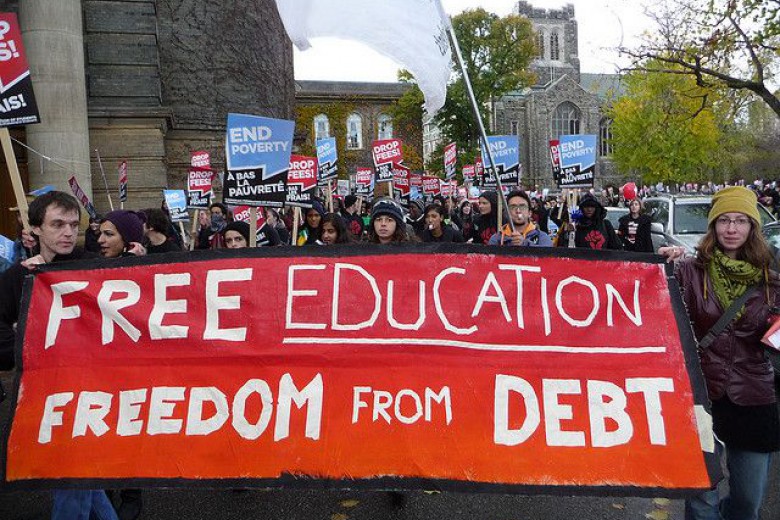
I am a feminist. In fact, most people who know me would say that feminism informs practically everything I do: what I read, how I relate to people, what forms of political action I undertake—everything, some might say, except my decision to home-school my children.
To many, this is one part of my life that seems out of line with my feminist politics. For one thing, friends have pointed out, it makes the structure of my family seem strangely traditional: my children’s dad makes the money and I do more of the child care. And my decision to home-school means, in effect, that I will not be able to have a full-time career until my children are grown up.
Then there’s the broader social context. The public image of the home-schooling mother most often portrayed in mainstream pop culture is that of a God-fearing woman who devotes her life to her husband, children and home. For example, a series of reality TV shows about the Duggar family—a home-schooling fundamentalist family with 17 children—ran recently on The Learning Channel and the Discovery Health Channel. The Duggars have appeared on many mainstream talk shows as well, including The View and Jimmy Kimmel Live. And this depiction isn’t entirely divorced from reality: a U.S. study by the National Center for Education Statistics found that 72 per cent of home-schooling parents surveyed indicated that “providing religious or moral instruction” was one of their reasons for home-schooling. For 38 per cent, it was their main reason.
It is no secret that many home-schoolers in North America are strict evangelical Christians—a group that is staunchly opposed to feminism, to reproductive rights for women, and to civil rights for gays, lesbians, transgendered people and bisexuals. Not exactly the company I keep.
A recent article on the Fox News website goes as far as to posit home-schooling as a direct challenge to feminism: an opportunity for families to protect their children (particularly their boys) from the forces of feminism, which have, according to the author, created a “PC” education system that “shortchanges” boys.
Obviously, I don’t see it that way. In fact, for me one of the most troubling features of today’s public education system is the pervasiveness of sexism and sexual violence in schools. In fact, a recent report by the Toronto District School Board found that “violence against girls and young women is a pervasive problem” in Toronto public schools. Sexual harassment of girls by boys is too common; sexist attitudes and stereotypes continue to negatively affect the self-confidence and personal development of girls and boys; and the influence of peers, teachers and curriculum tend, in both overt and subtle ways, to pressure children into restrictive gendered boxes that distort the way they think, act, and try to look. So, yes, boys are harmed by what happens in schools today. But the problem is too little feminism, not too much. In fact, if the public system were really pushing a feminist and queer-positive agenda as the Fox article alleges, my son would probably be sitting in a cold, hard desk seat right now.
I know I’m not alone. A vocal minority of home-schoolers are progressives, even radicals, who home-school as a way to offer their children the freedom to explore their intellectual interests and to express themselves in a loving, nurturing environment. Countless progressive home-schoolers (many of whom practice “unschooling,” an unstructured, child-directed approach to learning) not only reject the conservative beliefs about women and families held by evangelical Christians, but are in fact creating new ways of arranging families and of living and learning in a feminist way.
For one thing, feminist home-schooling families are usually not as traditional in their structure as they might at first appear. In my own case, the imbalance in money making may look conventional, but all domestic duties—cooking, cleaning, laundry, and so on—are divided equally. And although I don’t get paid for it, I am a full-time student completing my BA; I’m also a dedicated community activist. All the feminist home-schooling parents I talked to for this article were engaged in some sort of employment outside the home. This included one restaurant owner, a few writers, a chaplain at a hospital, two doulas, and one individual who makes and sells baby slings.
While it is true that the majority of home-schoolers are from two-parent households in which the father makes the most income, 18 per cent of home-schooling families in the U.S. are single-parent households. This means that these families are finding creative ways to home-school even when society makes it hard for them to be with their children for the majority of their time while surviving financially. Home-schooling outside of the traditional family unit can create new and alternative forms of family structure, which can further help to challenge sexism in our society.
As Adriana Johnson, a home-schooling mom of two from Calgary, tells me, “We describe our financial situation as ‘two people working three-quarters of a job between them for one income.’ We are both self-employed and work from home. On average weeks, each of us spends the equivalent of two full-time workdays, maybe three, on paid work.”
The vision of a home-schooling family as one in which the mother is immersed in domestic duties does not reflect the lived experiences of many home-schooling feminist parents. In fact, choosing to home-school one’s children is in many ways the opposite of choosing to work at domestic duties. Catharine Crawford, an unschooling mom of three from southwestern Ontario, explains: “Feminism lets me choose to be home-based in my own way, and celebrate all my strengths, be they culturally constructed as masculine or feminine. My work as a feminist is to counter the way in which culture has warped biological difference into an essentialist, inequitable framework for living as ‘female’ or ‘male.’”
Many of the mothers I talked to emphasized the need to put value on the work they do as home-schooling parents as a way to counter the seemingly traditional arrangement of their families. Crawford explains to her children that, “Papa has gone to work, and it is my work to stay home with you.”
Home-schooling encourages my children and I to explore our interests together—though when our interests diverge we don’t hesitate to explore them separately. I knit, garden, do activist work, and engage in my intellectual pursuits alongside my children. With a few exceptions, home-schooling does not limit me in exploring my interests; only child-unfriendly barriers do.
As a feminist and politically progressive home-schooler, I sometimes feel the tension of having rejected the publicly funded education system for what many regard as an individual solution to the current problems in the mainstream education system. However, the term “_home_-schooling” actually fails to capture the breadth of my day-to-day life with my kids; we often spend much of the day out in nature or using public resources such as libraries and community centres. We regularly co-operate with other home-schoolers, attend community activities, and interact with our neighbours and other folks in our city. We spend much of our spring and summer, for example, at our community garden plot, working and learning alongside the other gardeners. It would be more accurate to think of what we do as community-based learning rather than home-schooling.
Gender-free schooling
Many of the home-schooling mothers I spoke to mentioned how a relaxed or “unschooling” approach to home-schooling allows their children to fully explore all their interests, free from the restrictions of gender stereotyping. Children are supported in learning in whatever ways come most naturally to them as individuals, regardless of their gender.
As Johnson describes, “My daughter learns by listening and modelling. My son learns by experimenting and doing. I do not try to force her to learn the way he does, nor him the way she does—there is no artificial mould into which they have to fit.” Nancy, a home-schooling mother of six from Toronto, also echoes the benefits of this approach in countering sexist attitudes in our society: “I try to keep my daughter aware of the things that she might like to do, like math and science (my favourites). My second son loves little figurines—he has a cabinet full of beautiful tiny things, because that’s who he is. Nobody ever said that ‘boys don’t do that.’”
In fact, freedom from gender stereotyping is one of the benefits most mentioned by the feminist home-schoolers with whom I spoke. My feminism is informed by a queer perspective that gives me a decidedly anti-essentialist view of gender and sexuality. One of my main motivations to home-school is to allow my children to develop into full human beings without the restrictions of oppressive gender categorizations.
Johnson mentions some strategies that she and her partner consciously employ to foster gender-free development. “They are free to be themselves. Sometimes that means acting like ‘typical’ boys and girls. And sometimes that means something quite different or opposite or out of this world. Our son wore a princess dress to every party for about two years (also rubber boots and a military cap, with a water pistol frequently as part of the costume too).”
She describes how she and her partner both participate in all household tasks—from baking to using power tools—and how she plays around with gender when reading books to her children, to ensure that they “know a variety of people filling a variety of roles.”
The mothers I interviewed also mentioned challenging some of the ideas about gender their children encounter in broader society. As Catharine Crawford, the unschooler from southwestern Ontario, says, “Being home-based with my children allows all of us to question cultural assumptions, and tease them out in a relaxed way. My children are free to behave and make choices with less influence from stereotypes of what it is to be male or what it is to be female. Schooled children are not always given the time to see the cages we have built for our gendered selves, but in our free-range living here, we can feel free to be girly or boyish if we choose to.”
Linda Clement, an unschooling mother of two from Victoria, describes her home-schooling experience as allowing each of her children to be viewed as “a whole, complex, exploring human. If he wants to curl his hair, it’s his hair. If she wants a buzz cut, it’s her head. If she wants to read the big book of monster trucks, they’re her eyeballs. If he wants to read the sappy melodrama, they’re his eyes.”
Home-schooling can give children the freedom to learn in a truly feminist way. In my classroom, women are never written out of history. In fact, feminist history is part of what I discuss with my children. More than that, however, I teach them how to critically engage with the world: to question assumptions and biases (even those coming from me!) and to think about what might be missing from an historical account or who might have a different perspective than the one being presented. As Beatrice Ekwa Ekoko, who puts together a weekly radio show called Radio Free School with her children, remarks, “If you are encouraging your child’s curiosity, inquisitiveness and questioning of all that they see, then I think you can raise some pretty tough-minded feminist children—female or male.”
Of course, many teachers in the public system also share a feminist perspective—but others don’t. Some teachers are anti-feminist and others don’t question or challenge sexism in a very meaningful manner. Such is the reality of raising children in a society in which sexism still runs deep, in spite of advances on many fronts.
“The children are guardians of their own learning”
Although I reject essentialist descriptions of women as less competitive than men, I do think that feminists have tended to value a less competitive, less hierarchical approach to learning, particularly at the university level. Home-schooling, especially unschooling, takes a similar approach but applies it to children. There is no testing, no grading and no ranking. My children explore their intellectual interests because they want to, not because they have to. They are empowered to create their own learning path, with me as an active facilitator. Far from limiting my children, this approach has led them to explore a wide range of interests at a very young age.
As Crawford points out, “An anti-sexist learning approach means letting children unfold in a way unfettered by cultural assumptions because the children are guardians of their own learning. There is little pressure from grown-ups about what’s ‘appropriate’ for one’s age or gender. There is time to question, and time to be aware of ourselves and our choices. It is wonderful.”
The 1996 book A Sense of Self: Listening to Home-schooled Adolescent Girls by Susannah Sheffer explores the way in which home-schooling allows girls to become confident about their intellectual and physical capabilities and allows them to resist gender stereotyping by exploring their interests without being limited by gender roles. Sheffer, who interviewed 50 home schooled girls, found that even when their parents did not support feminism, the girls, in being encouraged to explore their own interests, grew to be relatively free of harmful gender stereotypes. Statistics about the academic achievements of home-schoolers consistently show that home-schooled children score above schooled in standardized testing. A study by the National Home Education Research Institute showed that homechooled children outperformed schooled children on standardized tests by 30 to 37 per cent in all subjects. Similar statistics gathered by various state education departments in the United States have found similar results. Although as an unschooler I have serious objections to standardized testing being used as a measure of knowledge or ability, these statistics do seem to point to the positive results of individualized, child-led learning.
While home-schooling can create some challenges for a woman trying to live a feminist life, the home-schoolers I spoke to have all found that it can also be a deeply feminist act. As Beatrice Ekwa Ekoko says, “If feminists care about a good future for women, then looking at institutions that oppress and degrade women and children ought to extend into looking at the places where some of these have their beginnings: namely, the school.” The common perception of home-schooling as conservative and closed-minded needs to challenged and replaced with a more complex view of home-schooling families, and with further exploration of what feminist pedagogy for children can look like. Feminist home-schooling can provide an important alternative to conventional ways of educating and socializing children—and of organizing families.
Home-schooling resources
Magazines
Live Free, Learn Free
A magazine by, about, and for unschooling families.
www.livefreelearnfree.com/
Life Learning
An inspiring Canadian magazine for unschoolers.
www.lifelearningmagazine.com/
Unschooling How-to Books
Teach Your Own by John Holt
Holt wrote many books about unschooling and progressive education. This book is the one that most explicitly discusses the hows and whys of unschooling.
A Sense of Self: Listening to Home-schooled Adolescent Girls by Susannah Sheffer
Explores the empowering effect that home-schooling has on girls and young women.
The Teenage Liberation Handbook: How to Quit School and Get a Real Life and Education by Grace Llewellyn.
Explores about how young people can learn outside of school. Directed at high school-aged youth but useful for unschooling families with children of all ages.
The Unschooling Handbook: How to Use the Whole World As Your Child’s Classroom by Mary Griffith
A very practical and useful guide on how to unschool.
Books on Radical Learning
Summerhill School: A New View of Childhood by A.S. Neil
A book written by the founder of the famed free school located in England. First published in 1960, this book inspired generations of people to explore progressive ways of helping children to learn.
Deschooling Society by Ivan Illich
The influential social reformer puts forward an argument for deinstitutionalizing education not just for children but for all members of society.
Black Ants and Buddhists: Thinking Critically and Teaching Differently in the Primary Grades by Mary Cowhey
This is not a home-schooling book at all, but a book written by an American public school teacher. However, progressive home-schoolers will find it useful for the author’s exploration of how to help young children learn about social and environmental justice.
Email lists
“Unschooling Canada”
An email list for unschooling families in Canada which offers a lot of interesting discussion and supportive advice.
groups.yahoo.com/group/Unschooling_Canada/
“Unschooling Resources”
A list created by the publisher of Live Free, Learn Free on which people share resources useful to unschoolers.
groups.yahoo.com/group/UnschoolingResources/
Journals
The Journal of Unschooling and Alternative Learning
An academic journal that focuses on unschooling and alternative learning published out of Nipissing University.
Becky Ellis is an unschooling mama of two, an anthropology student at the University of Western Ontario, and a community activist living in London, Ontario.






